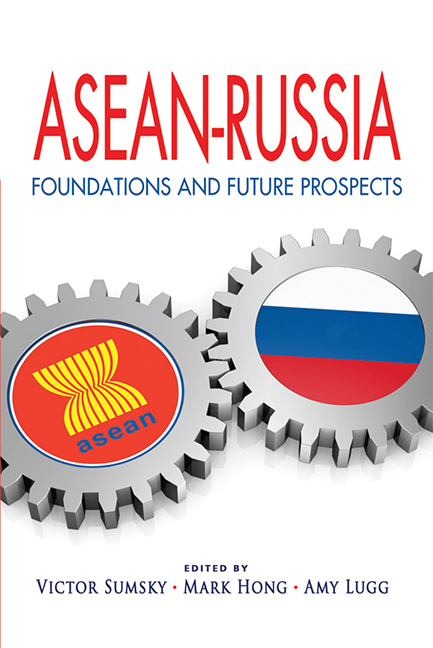Book contents
- Frontmatter
- Contents
- Foreword
- Preface
- About the Contributors
- Keynote Address
- Opening Remarks
- Keynote Address
- Introduction: Russia and the ASEAN Member States: Political and Economic Cooperation in Progress
- SECTION I WISEMEN'S VIEWS
- SECTION II GEOPOLITICS
- SECTION III BILATERAL RELATIONS
- What Singapore May Offer to Russia? The Present State and the Prospects of Relations
- Myanmar-Russia Relations in a Changing World: Growing Ties based on Strategic Partnership and Economic Prospects
- Russian-Myanmar Relations
- Russia-Thailand Relations: Historical Background and Contemporary Developments
- Russia and Vietnam: Building a Strategic Partnership
- Malaysia-Russia Relations: Revving up a Distant Relationship
- Cambodia and the USSR/Russia: Fifty-five Years of Relations
- SECTION IV Business and Economics
- SECTION V CULTURE AND EDUCATION
- EPILOGUE
- Index
Malaysia-Russia Relations: Revving up a Distant Relationship
from SECTION III - BILATERAL RELATIONS
Published online by Cambridge University Press: 21 October 2015
- Frontmatter
- Contents
- Foreword
- Preface
- About the Contributors
- Keynote Address
- Opening Remarks
- Keynote Address
- Introduction: Russia and the ASEAN Member States: Political and Economic Cooperation in Progress
- SECTION I WISEMEN'S VIEWS
- SECTION II GEOPOLITICS
- SECTION III BILATERAL RELATIONS
- What Singapore May Offer to Russia? The Present State and the Prospects of Relations
- Myanmar-Russia Relations in a Changing World: Growing Ties based on Strategic Partnership and Economic Prospects
- Russian-Myanmar Relations
- Russia-Thailand Relations: Historical Background and Contemporary Developments
- Russia and Vietnam: Building a Strategic Partnership
- Malaysia-Russia Relations: Revving up a Distant Relationship
- Cambodia and the USSR/Russia: Fifty-five Years of Relations
- SECTION IV Business and Economics
- SECTION V CULTURE AND EDUCATION
- EPILOGUE
- Index
Summary
INTRODUCTION
The fluidity and changing character of international relations in Southeast Asia in the early 2010s is now axiomatic. American influence continues but its “hegemonic” presence is declining. This has been balanced by China's rising role, and the presence of other Asian powers like Japan and India. What about the role of Russia today? Chances are that it will play a larger role in the near future. It is in this context that this essay examines Malaysia-Russian relations. Malaysian foreign policy over the years shifted from its pro-West stance to one that put the accent on non-alignment and an equidistant relationship with the major powers. Malaysia by the 1970s had championed the neutralization of Southeast Asia and promoted a Zone of Peace Freedom and Neutrality (ZOPFAN) for the region. These policies had sat well with Soviet, and later, with Russian postures of hedging and balancing U.S. and Chinese power in the region. In general, Malaysia's foreign policy is also intimately tied to the Association of Southeast Asian Nations (ASEAN), which it helped to establish in 1967. It has also played the role of being a catalyst for change in Southeast Asian foreign policy as a founding member of ASEAN. Thus, Russia's growing relationship with ASEAN also augments its relationship with Malaysia. While Malaysian-Russian ties have in the past been distant and low key, more recently they have seen considerable advancement in a broad spectrum of areas, particularly during the Mahathir era and after. These relationships have spanned educational and technical cooperation, capped by important arms deals. The essay provides an historical overview of the relationship and explores the prospects for relations in the future.
HISTORICAL OVERVIEW
Malaysia's past relations with the Soviet Union, then later, Russia, can be divided into two broad periods. During the Cold War, relations grew from non-recognition of the communist state, the Soviet Union of Socialist Republics (USSR or Soviet Union), to one in which the establishment of diplomatic relations on 3 April 1967 brought about the thawing of frosty political relations and a growing economic engagement.
- Type
- Chapter
- Information
- ASEAN-RussiaFoundations and Future Prospects, pp. 184 - 195Publisher: ISEAS–Yusof Ishak InstitutePrint publication year: 2012



